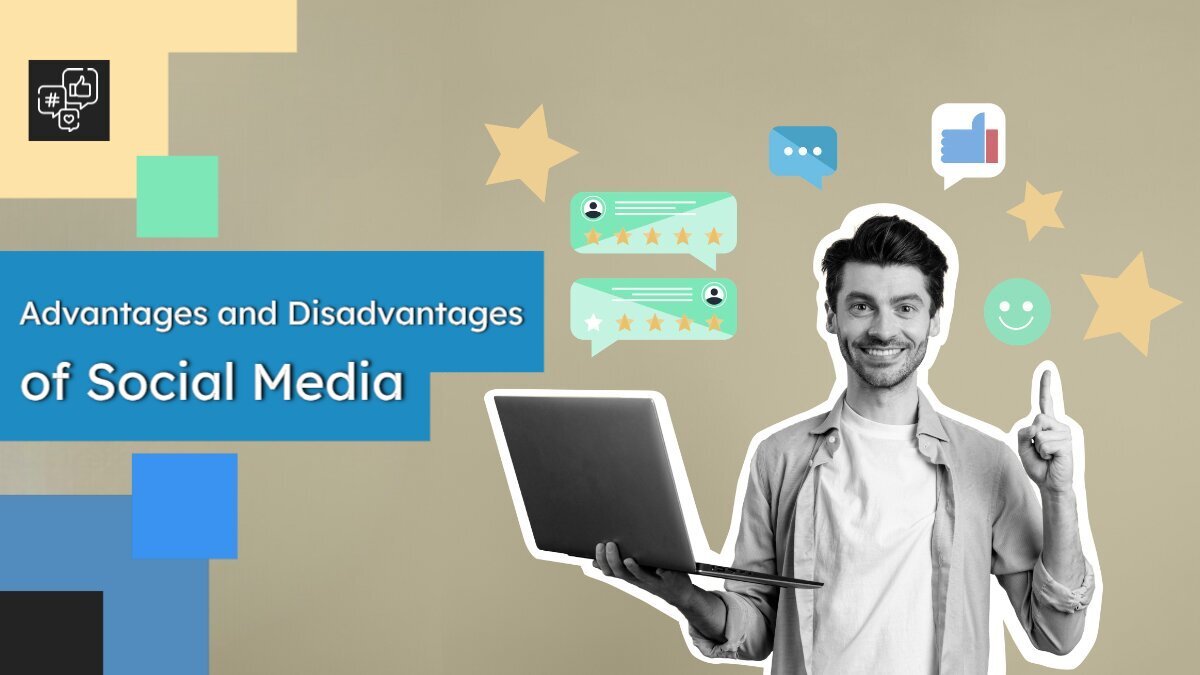Social media has transformed the way people connect, communicate, and consume information. While it offers numerous benefits, it also comes with certain drawbacks. In this article, we explore the 20 key advantages and disadvantages of social media to provide a balanced perspective on its impact.
Advantages and disadvantages of Social Media
Top 20 Advantages of Social Media
1. Global Connectivity
Social media allows people to stay connected with friends, family, and colleagues worldwide, breaking geographical barriers and enabling instant communication.
2. Information and Awareness
It serves as a powerful tool for spreading news, educational content, and updates on global events, keeping users informed in real time.
3. Business Growth and Marketing
Brands can leverage social media for digital marketing, brand awareness, and customer engagement, reaching a global audience at a fraction of traditional advertising costs.
4. Networking Opportunities
Professionals can connect through LinkedIn, Twitter, and industry-specific platforms, opening doors to career opportunities and business collaborations.
5. Entertainment and Engagement
Social media offers a vast array of entertainment, from viral videos and memes to live streaming and interactive content, keeping users engaged.
6. Customer Support and Feedback
Businesses use social media as a customer service tool, providing real-time support and collecting valuable feedback for improvement.
7. Education and Learning
Platforms like YouTube, LinkedIn Learning, and Coursera offer free and paid courses, making education accessible to a broader audience.
8. Social Activism and Awareness
Movements such as #MeToo and #BlackLivesMatter gained global traction through social media, helping drive social change and awareness.
9. Influencer Marketing
Brands collaborate with influencers to reach target audiences, making advertising more personal and engaging.
10. Cost-Effective Advertising
Businesses can run targeted ads on platforms like Facebook, Instagram, and TikTok, allowing them to reach specific demographics affordably.
11. Real-Time Updates
From sports events to political news, social media provides real-time updates, keeping users informed instantly.
12. Crowdsourcing and Fundraising
Platforms like GoFundMe and Kickstarter help individuals and organizations raise funds for causes, businesses, and emergencies.
13. Brand Building and Reputation Management
Companies can use social media to shape their public image, engage with customers, and manage crises effectively.
14. Health and Wellness Support
Communities focused on mental health, fitness, and self-care provide users with support, tips, and motivation.
15. Remote Work and Collaboration
Social platforms enable remote teams to collaborate via tools like Slack, Trello, and Microsoft Teams.
16. Increased Traffic for Websites
Sharing blog posts and website content on social media boosts visibility and directs traffic to business websites.
17. Enhanced Creativity and Self-Expression
Users share their art, music, and opinions, fostering creativity and innovation.
18. Better Political and Social Awareness
Governments and organizations use social media to communicate policies, engage with citizens, and raise awareness on key issues.
19. Real-Time Feedback on Products and Services
Companies gain valuable customer insights, helping them improve products and services.
20. Community Building
Niche groups and forums help people connect with like-minded individuals, creating supportive online communities.
Top 20 Disadvantages of Social Media
1. Privacy and Security Risks
Users are vulnerable to hacking, identity theft, and data breaches, making privacy a significant concern.
2. Cyberbullying and Online Harassment
Trolling, hate speech, and cyberbullying negatively impact mental health, especially among young users.
3. Addiction and Time Consumption
Excessive use of social media can lead to decreased productivity, sleep deprivation, and mental exhaustion.
4. Spread of Misinformation
Fake news and misleading content can spread quickly, influencing public opinion and decision-making.
5. Negative Impact on Mental Health
Social media can contribute to anxiety, depression, and low self-esteem due to comparison culture and unrealistic portrayals.
6. Decreased Face-to-Face Interaction
Over-reliance on social media reduces in-person communication, affecting real-life relationships and social skills.
7. Algorithm Manipulation and Bias
Social media platforms control content visibility, sometimes promoting divisive or biased narratives.
8. Data Exploitation by Companies
Companies track user behavior and personal data for targeted ads, raising ethical concerns about privacy.
9. Fake Influencers and Scams
Many fake accounts and deceptive influencers mislead users for monetary gain.
10. Political Manipulation
Social media has been used for propaganda, election interference, and spreading divisive content.
11. Health Risks Due to Screen Time
Extended screen exposure can lead to eye strain, headaches, and sedentary lifestyle-related health issues.
12. Echo Chambers and Filter Bubbles
Algorithms reinforce user biases by showing similar content repeatedly, limiting exposure to diverse perspectives.
13. Impact on Work Productivity
Employees spending excessive time on social media at work face reduced efficiency and job performance issues.
14. Online Frauds and Phishing Attacks
Scammers use social media to lure users into fraudulent schemes and identity theft.
15. Unrealistic Beauty Standards
Filters and photo editing create unrealistic beauty expectations, affecting self-esteem and mental health.
16. Excessive Advertising and Spam
Users are often bombarded with intrusive ads and spam content, reducing their online experience quality.
17. Fake News Virality
Misinformation spreads faster than factual news, misleading millions of users worldwide.
18. Manipulation of Public Sentiment
Political groups and organizations exploit social media to manipulate opinions and influence societal behavior.
19. Limited Regulation and Control
Governments and platforms struggle to control harmful content effectively without infringing on free speech.
20. Psychological Effects on Children and Teens
Younger users are particularly vulnerable to online peer pressure, cyberbullying, and addictive behaviors.
Final Thoughts
Social media is a powerful tool that has revolutionized communication, business, and entertainment. While it offers numerous advantages, it also presents significant challenges. To maximize the benefits while minimizing the risks, users must practice responsible usage, verify information sources, and maintain a healthy digital balance.
Faq’s
Q1: What are the main advantages of social media?
A: Social media helps in global communication, brand promotion, business growth, and staying informed. It also offers networking, entertainment, and job opportunities.
Q2: What are the biggest disadvantages of social media?
A: Excessive social media use can lead to privacy concerns, mental health issues, cyberbullying, misinformation, and decreased productivity.
Q3: How does social media impact businesses?
A: Businesses use social media for marketing, customer engagement, brand awareness, and sales. However, negative reviews and crises can impact reputation.
Q4: Is social media good or bad for mental health?
A: Social media can foster connection and support, but excessive use may lead to anxiety, depression, and low self-esteem due to comparison and cyberbullying.
Q5: How can I use social media safely?
A: To use social media safely, adjust privacy settings, avoid sharing personal information, fact-check news, and limit screen time to prevent overuse.
What do you think about the impact of social media? Share your thoughts in the comments below!
(Don’t forget to share this article if you found it helpful!)


